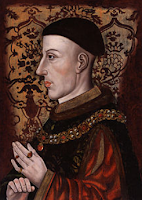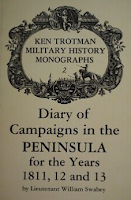Henry V, one the great warrior kings in medieval England, died exactly six centuries ago today. He is honoured especially for his military successes in France culminating in the famous victory at the Battle of Agincourt. There exists a diary-like account of the Battle - amazingly so, since it must vie to be one of the very earliest of extant European diaries. Written in Latin by an anonymous priest, it was translated into English for a 19th century history of Henry V’s expedition into France.
Henry was the eldest son of Henry, earl of Derby (afterward Henry IV), by Mary de Bohun. On his father’s exile in 1398, Richard II took the boy into his own charge, and knighted him in 1399. He was well educated, grew up fond of music and reading and became the first English king who could both read and write with ease in the vernacular tongue. When his father became king, Henry was created earl of Chester, duke of Cornwall, and prince of Wales, and soon afterward, duke of Aquitaine and Lancaster. From October 1400 the administration of Wales was conducted in his name, and in 1403 he took over actual command of the war against the Welsh rebels, a struggle that absorbed much of his time until 1408.Henry succeeded his father in March 1413. In the early years of his reign he was threatened by various rebels and conspiracies but suppressed them ruthlessly. However, his main ambition was towards France. Not content with lands ceded by the French at the Treaty of Calais in 1360, he laid claim to Normandy, Touraine, Maine, and to parts of France that had never been in English hands. Negotiations with the French and their King Charles, initiated during the reign of Richard II, were finally broken off in June 1415, but Henry was far advanced in his preparations for war.
Henry’s first campaigns in 1415 brought the capture of Harfleur and the great victory of Agincourt, triumphs which brought him much power in the European arena. The following year he was visited by the Holy Roman emperor Sigismund, with whom he made a treaty of alliance at Canterbury. The cooperation of these two rulers led directly to the ending of the papal schism through the election of Martin V in 1417. Using sieges, Henry gradually conquered of Normandy; and Rouen, the capital of northern France, fell in early 1419. Other successes followed, and, in 1420, Henry was recognised as heir to the French throne and regent of France; he was married to Catherine, the daughter of Charles VI. His triumphs were short-lived, though, as his health grew worse, and he died of camp fever at the château of Vincennes on 31 August 1422. Henry VI, just 9 months old, became King. Further information is available at Wikipedia, Encyclopaedia Britannica, History.com, or The Royal Family.
An anonymous priest, it seems, accompanied Henry on his expedition to France and at the Battle of Agincourt; and he left behind a diary-like record written in Latin. This was translated into English to become the centrepiece of a History of the Battle of Agincourt and of the Expedition of Henry the Fifth into France in 1415 by Sir Harris Nicolas (published by Johnson & Co., 1832). The book itself can be freely downloaded from Internet Archive. However, it was also reviewed in the Journal of the Society for Army Historical Research (Vol 12, No. 46, summer 1933) by Sir James Edmonds.
Edmonds titles his piece An Early War Diary - indeed, if the text is considered a diary it is one of the very earliest written in Europe to have survived - see The Diary Junction. He explains that the book has a narrative ‘deduced from such contemporary statements as were consistent with each other and with truth’. ‘The gem of the book,’ though, he adds, ‘is the translation of a diary, written in Latin, of an anonymous Priest who accompanied the expedition and was, he expressly states, present at Agincourt, where “I write this, sitting on horse-back among the baggage in the rear of the battle”. It is a first-class military record of the campaign, better kept than many diaries of 1914-1918.’ The translated diary covers the period from 7 August 1415, when Henry V embarked from Porchester, until 25 October, the day of the battle. Here are the opening passages of the text, and a section from a month or so later.
‘On Wednesday, the 7th of August, the King went from his Castle of Porchester in a small vessel to the sea, and embarking on board his ship called ‘The Trinity,’ between the ports of Southampton and Portsmouth, he immediately ordered that the sail should be set, to signify his readiness to depart; and at the same time to serve as a signal to the fleet, which was dispersed among the sea ports, to hasten the more speedily to him. And when, on the following day, being Sunday, almost all had arrived, he set sail with a favorable wind. There were about fifteen hundred vessels, including about a hundred which were left behind. After having passed the Isle of Wight, swans were seen swimming in the midst of the fleet, which in the opinion of all, were said to be happy auspices of the undertaking. On the next day, being Tuesday, about the fifth hour after noon, the King entered the mouth of the Seine, which passes to the sea from Paris, through Rouen and Harfleur, and anchored before a place called Kidecaus, about three miles from Harfleur, where he proposed landing: and immediately a banner was displayed as a signal for the captains to attend a council; and they having assembled in council, he issued an order throughout the fleet that no one, under pain of death should land before him, but that the next morning they should be prepared to accompany him. This was done lest the ardour of the English should cause them, without consulting danger, to land before it was proper, disperse in search of plunder, and leave the landing of the King too much exposed. And when the following day dawned, that is on Wednesday, the vigil of the Assumption of the Blessed Virgin, the sun shining, and the morning beautiful, between the hours of six and seven, the noble Knight, Sir John Holland, Earl of Huntingdon the King’s cousin, having been sent by his desire before day-break, in the stillness of the night, with certain horsemen as scouts to explore the country and place, the King, with the greater part of his army, landed in small vessels, boats, and skiffs, and immediately took up a position on the hill nearest Harfleur, having on the one side, on the declivity of the valley, a coppice wood towards the river Seine, and on the other enclosed farms and orchards, in order to rest himself and the army, until the remainder of the people, the horses, and other necessaries should be brought from the ships. [. . .]’
‘[On 17th of September], a conference was held with the aforesaid Lord de Gaucourt, who acted as captain, and with the more powerful leaders, whether it were the determination of the inhabitants, still remembering the penalties of Deuteronomy, to surrender the town, without suffering farther rigour of death or war. But the King, seeing his terms despised, and that they could not be overcome by the distress occasioned by a mild mode of attack, determined to proceed with more rigour against a people whose obstinacy, neither alluring kindness, nor destructive severity could soften.
Towards night, therefore, he caused proclamation by trumpet to be made in the midst of the squadrons, that all the mariners, as well as others who were on the stations assigned them by their captains, should be prepared on the morrow to storm and mount the walls, which had been rendered by the shot of our guns more convenient and safe for the purpose, and much more unfit for the enemy to make resistance, or even to protect themselves from destruction. Towards night he began to assail them more than usual with stones, that he might prevent them from sleeping, and thereby render them on the morrow more easy to conquer. But God himself, propitious and merciful to his people, sparing the effusion of blood which probably would have been shed in storming the walls, turned away from us the sword, and struck terror into our enemies, who were probably broken-hearted on account of the loss of the said bulwark, and hearing they were so suddenly to be assaulted and stormed; and also at the penalties of the law of Deuteronomy, if a fortified town be recovered from them while making resistance; and perplexed and harassed by the stones, and almost despairing of being rescued by the French, which they had expected long beyond the promised time. On that night they entered into a treaty with the King, that if he would deign to defer the assault, and would refrain from harassing and oppressing them with stones, they would surrender to him the town, and themselves, and their property, if the French King, or the Dauphin, his first-born, being informed, should not raise the siege and deliver them by force of arms, within the first hour after noon on the Sunday following.’











